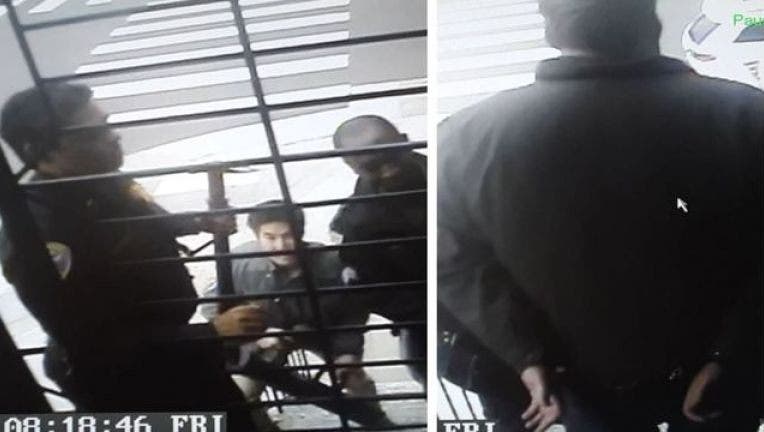Before raiding journalist's home, SF police were told to turn off body cams

San Francisco police knock on Bryan Carmody's door with sledgehammer and detain the freelance videographer. May 10, 2019. (Photo: Surveillance/Bryan Carmody)
SAN FRANCISCO - Before illegally raiding a freelance journalist’s home last year, San Francisco police were instructed to not activate their body-worn cameras, in apparent violation of the department's policy, according to an internal memo.
The Reporters Committee for Freedom of the Press obtained the memo written by Lt. Pilar Torres prior to the controversial 2019 raid on Bryan Carmody. Torres was among the internal affairs bureau investigators working to track down the confidential source of a police report on the death of the late-Public Defender Jeff Adachi. Carmody had obtained a copy of the report about Adachi.
The SFPD has a policy requiring its officers to turn on body cams when serving search warrants.
But Torres wrote that “this situation was a confidential investigation and (body-worn camera) footage could compromise the investigation.”
Torres cited the department’s general order which prohibits recording in situations that could “compromise the identity of confidential informants and undercover operatives.”
SUBSCRIBE TO KTVU'S NEWSLETTER
It’s not clear how that policy would have applied to the investigation into the leaked Adachi report. The internal affairs investigators were working to uncover Carmody’s source, not protect the source.
The department’s policy also says that officers are required to activate their cameras “when serving a search or arrest warrant.”
Sgt. Michael Andraychak, a San Francisco police spokesman, said he could not comment on the memo "due to a pending administrative investigation."
Katie Townsend, legal director for the Reporters Committee for Freedom of the Press, called the order “deeply troubling.”
“Body-worn cameras are designed to increase police transparency and accountability,” she said.
Chief Bill Scott has since apologized for the raid and the judges who signed five search warrants for Carmody’s home, office and phones have since quashed and unsealed their contents.
California’s Shield Law protects journalists from being compelled to reveal sources.
Carmody has worked for decades as a freelance journalist in San Francisco and has a press pass issued by the SFPD.
The city later agreed to pay him $369,000 to settle a lawsuit over the raid.
Evan Sernoffsky is an investigative reporter for KTVU. Email Evan at evan.sernoffsky@foxtv.com and follow him on Twitter @EvanSernoffsky

